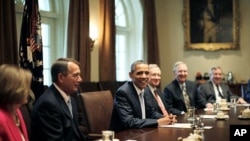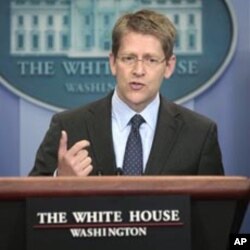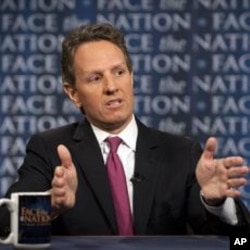President Barack Obama and eight Republican and Democratic congressional leaders hold a fifth round of negotiations on Thursday at the White House aimed at achieving a deficit reduction and debt compromise. Talks on Wednesday ended with a tense confrontation between Obama and a key Republican lawmaker.
What happened?
Though the White House did not comment, and accounts by Democratic and Republican aides and a key Republican lawmaker differ, all indicate that the nearly two hour meeting was the most contentious to date, as all sides face increasing pressure to find a solution to the debt impasse.
As Republican aides told it, and House Majority Leader Eric Cantor himself was quoted as saying to reporters, Obama abruptly walked out at the end of the meeting following a tense exchange over how to resolve the deficit and debt impasse.
Democratic congressional sources disputed that, saying Obama spoke in frustration about political posturing and lack of compromise, but simply ended the meeting.
Whatever did occur underscores the high stakes in the negotiations to come up with a compromise that can avert a federal government debt default on August 2. The tense exchanges also came as a major financial rating firm, Moody’s, warned that the the U.S. credit rating was on watch for possible downgrade.
McConnell proposal
Earlier, White House spokesman Jay Carney addressed a proposal by Senate Minority Leader Mitch McConnell for a procedurally-complex legislative tactic that would have essentially transferred authority, and political responsibility, for raising the debt ceiling from Congress to the president.
McConnell proposed passing legislation to allow Obama to raise the debt limit in three stages by $2.5 trillion, through the 2012 presidential election year, but requiring the president to list spending cuts at least as high as increases in the debt ceiling.
Carney called the proposal an acknowledgment by Republicans that there is no alternative to raising the debt limit. He did not reject it outright but said Obama remained focused on achieving the largest possible deficit reduction deal.
"The linkage that was created that tied significant deficit reduction to this deadline, was so that we could work together, roll up our sleeves and do this," said Carney. " Well the president is ready and willing to do that, he is willing to make compromises, he is willing to go big here."
McConnell spoke on the Senate floor before he and other lawmakers went to the White House for their fourth round of talks with Obama.
"Americans don't want tax hikes, they don't want phony spending cuts, they don't want a debt disapproval plan, and they don't want us to default on our debts," he said. "They want real cuts, and real reform, now."
In a CBS News television interview Tuesday, the president responded to McConnell's statement that a solution to the nation's deficit spending problems was unobtainable with Obama in the White House.
"You know, Mr. McConnell said, I think the day I was elected, that his job was to try to see me beat. I think what the American people are looking for is not that kind of partisan politics," Obama said.
Worst case scenario
White House negotiations have included Treasury Secretary Timothy Geithner, who has warned of the dire consequences of a debt default on August 2. Geithner will meet with Obama and Vice President Joe Biden before a fifth round of talks with lawmakers on Thursday.
In testimony to a congressional committee on Capitol Hill on Wednesday, Federal Reserve Chairman Ben Bernanke said a default would have wide-ranging impacts.
"Clearly if we went so far as to default on the debt it would be a major crisis," Bernanke said.
White House spokesman Carney was asked on Wednesday if Obama would rule out a very short stop gap measure, if negotiators were on the edge of a larger compromise Carney responded that the president believes there is momentum toward achieving a significant balanced deficit reduction package.
As he presses his case for a large deficit solution coupled with a debt ceiling agreement, Obama will give interviews on Thursday to major media market television stations, just two hours before Republican and Democratic lawmakers return for what could be a crucial round of talks.







